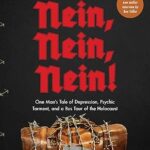![]()
“Why stay in this country, listening to mere Proud Boy-esque neo-Nazis, when you could go to the source, to Poland and Germany, and experience the birthplace of actual Nazi-Nazis? How better to soak up fascist antibodies?”
There was more to it though. Novelist and screenwriter Jerry Stahl felt his life was falling apart. As a recovering addict grappling with divorce, this existential crisis led him to question the significance of his own struggles in comparison to the unimaginable horrors endured by those during the Holocaust. How many had the same worries as he did before they were thrown into the camps?
To try and find answers to these questions, he decided to go on a guided bus tour of the most infamous concentration camps. Auschwitz, Buchenwald, Dachau.
Through vivid descriptions and raw emotions, he navigates the grim reality of the camps while also exposing the unsettling commercialization surrounding them, from souvenir shops to snack bars.
What sets Nein, Nein, Nein apart is Stahl’s ability to seamlessly transition between gut-wrenching accounts of the Holocaust—which is often difficult to read- to uproarious humor, often directed at himself. His candid exploration of his own past and relationships with fellow tourists adds depth to the story. We learn how he comprehended the horrors and internalized this entire experience.
Stahl’s narrative remains poignant and engaging throughout. He confronts the horrors of the camps head-on, refusing to sugar-coat or sanitize the truth.
Another striking aspect of this memoir is Stahl’s inclusion of historical figures whom many of us may be unaware of, such as the infamous Ilse Koch, known as the “Bitch of Buchenwald. Additionally, the interview with Ben Stiller at the book’s conclusion adds an interesting layer to Stahl’s reflections.
Nein, Nein, Nein is a must-read for all. Stahl imparts this important lesson “Be grateful. Even if the ax is always falling.” He reminds us that the years between holocausts are the exception, and we must savor these moments.


